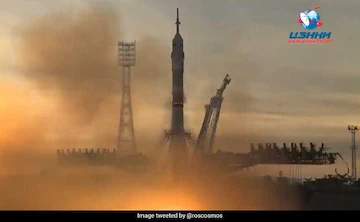Russian cosmonaut Oleg Kononenko, Anne McClain of NASA and David Saint-Jacques of the Canadian Space Agency launched for a six-and-a-half month mission on the International Space Station.

The Soyuz was "successfully launched into orbit," says Russia's space agency Roscosmos.
Story Highlights
- The launch was the first for the Soviet-era Soyuz since October 11
- On October 11, a rocket carrying 2 people failed just after blast-off
- Risk is part of our profession, crew commander Kononenko said
Baikonur:
A Soyuz rocket carrying Russian, American and Canadian astronauts took off from Kazakhstan and reached orbit on Monday, the first manned mission since a failed launch in October.
Russian cosmonaut Oleg Kononenko, Anne McClain of NASA and David Saint-Jacques of the Canadian Space Agency blasted off for a six-and-a-half month mission on the International Space Station on schedule at 1131 GMT.
A few minutes after their rocket lifted off from the Baikonur Cosmodrome, Russian space agency Roscomos announced that the capsule was "successfully launched into orbit".
NASA administrator Jim Bridenstine confirmed on Twitter that the crew were "safely in orbit" and thanked the US and Russian teams "for their dedication to making this launch a success".
The journey to the orbital lab takes six hours, with docking expected at 1736 GMT.
It was the first manned launch for the Soviet-era Soyuz since October 11, when a rocket carrying Russia's Aleksey Ovchinin and US astronaut Nick Hague failed just minutes after blast-off, forcing the pair to make a harrowing emergency landing.
They escaped unharmed but the failed launch -- the first such incident in Russia's post-Soviet history -- raised concerns about the state of the Soyuz programme.
The Soyuz is the only means of reaching the ISS since the United States retired the space shuttle in 2011.
Kononenko, McClain and Saint-Jacques smiled and gave thumbs up to the cheering crowd including relatives as they ascended into the Soyuz capsule.
At a press conference on the eve of the launch, crew commander Kononenko said the astronauts "absolutely" trusted teams preparing for the flight.
Risk "part of our profession"
"Risk is part of our profession," the 54-year-old said. "We are psychologically and technically prepared for blast-off and any situation which, God forbid, may occur on board."
McClain, a 39-year-old former military pilot, said the crew looked forward to going up.
"We feel very ready for it," she said.
Saint-Jacques, 48, described the Soyuz spacecraft as "incredibly safe".
October's accident had highlighted the "smart design of the Soyuz and the incredible work that the search and rescue people here on the ground are ready to do every launch," he said.
In a successful rehearsal for Monday's flight, a Soyuz cargo vessel took off on November 16 from Baikonur and delivered several tonnes of food, fuel and supplies to the ISS.
Russia said last month the October launch had failed because of a sensor damaged during assembly at the Baikonur cosmodrome, but insisted the spacecraft remained reliable.
While flight commander Kononenko is beginning his fourth mission to add to an impressive 533 days in space, both Saint-Jacques and McClain are flying for the first time.
European Space Agency astronaut Alexander Gerst, NASA's Serena Aunon-Chancellor and Sergei Prokopyev of Roscosmos will greet the trio when they arrive at the ISS.
Veteran Kononenko said the crew would conduct a spacewalk on December 11 as part of an investigation into a mysterious hole that has caused an air leak on the ISS.
Saint-Jacques will be the first Canadian astronaut to visit the space station since Chris Hadfield, who recorded a version of David Bowie's "Space Oddity" on board in 2013.
While on board, Saint-Jacques will be taking part in a Canadian experiment called "At Home in Space" which "takes a closer look at how crew members adapt to living with each other by creating a shared culture," according to the Canadian Space Agency.
Among the dozens of other experiments the new crew members will be involved in is one led by British scientists that will use worms to examine muscle loss in space.
The experiment could pave the way to new treatments for muscular conditions for people on Earth, according to the UK Space Agency.
"Spacewalking like rugby"
McClain served in Iraq and has represented the United States in women's rugby.
She has said that training to spacewalk resembled the sport since it demands "grit, toughness, mental focus, and more".
Russia-US cooperation in space has remained one of the few areas not affected by a crisis in ties between the former Cold War enemies.
But comments by the combative chief of the Russian space agency, Dmitry Rogozin, have raised eyebrows.
He recently joked Russia would send a mission to the Moon to "verify" whether or not NASA lunar landings ever took place.
In recent years Russia's debt-laden space industry has suffered a number of mishaps including the loss of cargo spacecraft and satellites.
- Get link
- X
- Other Apps
- Get link
- X
- Other Apps
Comments
Post a Comment